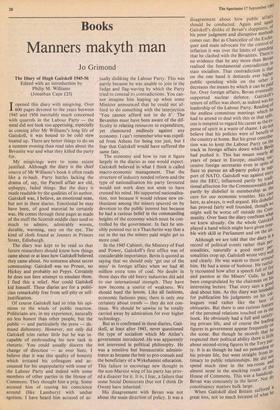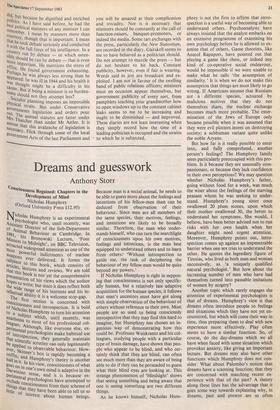Books
Manners makyth man
Jo Grimond
The Diary of Hugh Gaitskell 1945-56 Edited with an introduction by Philip M. Williams
. (Jonathan Cape £25) opened this diary with misgiving. Over 600 pages devoted to the years between 1945 and 1956 inevitably much concerned with quarrels in the Labour Party — the meal did not look too appetising, especially as coming after Mr Williams's long life of Gaitskell, it was bound to be cold stew heated up. There are better things to do on a summer evening than read tales about the Bevanite war and what they killed the party for.
My misgivings were to some extent justified. Although the diary is the chief source of Mr Williams's book it often reads like a re-hash. Party battles lacking the drama of, say, the Parnell affair are old, unhappy, faded things. But the diary is
made readable by the qualities of its author. Gaitskell was, I believe, an emotional man,
but not in these diaries. Emotional he may have been, of good material he certainly was. He comes through these pages as made of the stuff the Scottish middle class used so much to admire, admirably woven, durable, warming, easy on the eye. The kind of cloth found at Jenners in Princes Street, Edinburgh.
The diary was kept to be read so that future researchers should know how things came about or at least how Gaitskell believed they came about. No nonsense about secret communing: Gaitskell was no Proust, no Hickey and probably. no Pepys. Certainly he does not here attempt to emulate them. I find this a relief. Nor could Gaitskell kid himself. These diaries are for a politi- cian remarkably free from self-pity or self- justification.
Of course Gaitskell had to trim his opi- nions to the winds of public reaction. Politicians are, in my experience, naturally no less honest than other people, but the public — and particularly the press — de- mand dishonesty. However, not only did Gaitskell trim rather little but lie was in- capable of enshrouding his new tack in rhetoric. You could usually discern the change of direction — as over Suez. I believe that it was this quality of honesty which irritated his colleagues and ac- counted for his unpopularity with some of the Labour Party and indeed with some members of other parties in the House of Commons. They thought him a prig. Some accused him of touting his conscience around (like Lansbury) with undue egotism. I have heard him accused of ac-
tually disliking the Labour Party. This was partly because he was unable to join in the fudge and flag-waving by which the Party tried to conceal its contradictions. You can- not imagine him leaping up when some Minister announced that he could not af- ford to do something with the interjection 'You cannot afford not to do it'. The Bevanites must have been aware of the dif- ficulty in relating resources to expenditure, yet clamoured endlessly against any economy. I can't remember who was expell- ed from Athens for being too just, but I fear that Gaitskell would have suffered the same fate.
The economy and how to run it figure largely in the diaries as one would expect. Gaitskell believed in what I think is called macro-economic management. That the structure of industry needed reform and the type of nationalisation his party favoured would not work does not seem to have crossed his mind. He supported nationalisa- tion, not because it would release new en- thusiasm among the miners spurred on by devotion to the public interest but because he had a curious belief in the commanding heights of the economy which must be con- trolled by the government. In fact he sen- sibly pointed out in a Thatcherite way that a cut in the tax the miners paid might get us more coal.
In the 1945 Cabinet, the Ministry of Fuel and Power, Gaitskell's first office was of considerable importance. Bevin is quoted as saying that we should only 'get out of the mess' in foreign affairs when we had 40 million extra tons of coal. No doubt in those days the old heavy industries did add to our international strength. They have now become a source of weakness. We should heed the lesson. Like all fashions, economic fashions pass; there is only one certainty about trends — they do not con- tinue. We should be unwise to be totally carried away by admiration for ever higher technology.
But as is confirmed in these diaries, Gait- skell, at least after 1945, never questioned
the type of socialism which Mr Attlee's government introduced. He was apparently not interested in political philosophy. He was a sensitive but bureaucratic adminis- trator as became the heir to pro-consuls and the beneficiary of a Wykehamist education.
This failure to encourage new thought in the non-Marxist wing of his party has prov- ed a disaster for it. It is, 1 fear, a failure that some Social Democrats (but not I think Dr Owen) have inherited.
His disagreement with Bevan was not about the main direction of policy. It was a
disagreement about how public affai!'s should be conducted. Again and again,. Gaitskell's dislike of Bevan's sloppiness, 0' his poor judgment and disruptive methods comes out. But as Chancellor of the Excite' quer and main advocate for the control. of inflation it was over the limits of spendfitg that he clashed with the Bevanites. There Is no evidence that he any more than Bevan realised the fundamental contradiction 10 state socialism. That contradiction is that on the one hand it demands ever higher public spending while on the other ,It decreases the means by which it can be pald for. Over foreign affairs, Bevan eventually supported nuclear defence. Gaitske11.5 tenure of office was short, as indeed was hist leadership of the Labour Party. Reading °' the endless committee meetings which he had to attend to deal with this or that split, one is tempted to regard his career as the ex- pense of spirit in a waste of shame. I do not believe that his policies were of benefit to the country at home. But his great contribu. tion was to keep the Labour Party on tt!e track in foreign affairs down which Bent had pushed it. This has meant nearly 4° years of peace in Europe, enabling sue; cessive foreign secretaries even in spite 0' Suez to pursue an all-party policy in stIP‘, port of NATO. Gaitskell was against entr/ into the EEC, influenced partly by tradl: tional affection for the Commonwealth an° partly by disbelief in membership as the cure for our economic troubles. His crt.ser here, as always, is well argued. His disbehe' has proved fairly well founded, though We might well be worse off outside the Cont: munity. Over Suez the diary confirms whe,i, we knew already. On the whole Gaitskell played a hand which might have given tror ble with skill in Parliament and on the Although we are told that the diary 15 record of political events rather than pet.' sonalities, naturally a good manY Per,i sonalities crop up. Gaitskell wrote very and clearly. He was warm to those aroun,u him. He had a sense of humour. He ruehr ly recounted how after a speech full of fade and passion at the Miners' Gala, he ha. been congratulated by the chairman on htsd interesting lecture. That story says a g°°0 deal about him. As this diary was intend for publication his judgments on his ec)f leagues read rather like the best obituaries. But there is one curious feattli. of the personal relations touched on in, th! book. He obviously had a full and satt.s.f, mg private life, and of course the leaatrlor' figures in government appear frequentlY e the scene, But though he records that 'lie respected their political ability there is Iltt, about second-string figures in the Tory Po ty, It is as though he had no penumbta,t his private life, but went straight from IP* timacy to public relationships. He did 11°,11 spend much time in the tea-room all:e almost none in the smoking room of tti House of Commons. This was a handl Bevan was constantly in the latter. No
v constituency matters bulk large.
When Gaitskell died Britain suffered. great loss, not so much because of what " did, but because he dignified and enriched Politics. As I have said before, he had the hest Political manners of any minister I can remember. I mean by manners more than courtesY, though that is important. 1 mean that he took debate seriously and conducted
it with the full force of his intelligence. In a co
'miry run by debate — or which osten- sibly should be run by debate — that is even 11.1,13,re important. He mentions the stress of ,(3,„"fice. He found government exhausting. Perhaps he was always less strong than he aPPeared: he was ill in 1944 and his health it was thought might be a difficulty in his career. But if being a minister is so burden- some should not they attempt less? Socialist planning imposes an impossible Physical strain. But under Conservative governments legislation and orders pour Out The annual statutes are fatter under Mrs Thatcher than under Mr Attlee. It is untrue that this avalanche of legislation is IlecessarY. Flick through some of the local g°\lernment Acts of the last Parliament and you will be amazed at their complication and triviality. Nor is it necessary that ministers should be constantly at the call of function-raisers, banquet-promoters, or indeed the media. Some tart exchanges with the press, particularly the New Statesman, are recorded in the diary. Gaitskell seems to me to have behaved as a politician should. Do not attempt to muzzle the press — but do not hesitate to hit back. Constant publicity, however, even if fair is wearing. Words said in jest are broadcast and ex- ploited. I am not in favour of the swelling band of public relations officers; ministers must on occasion appear themselves, but government publicity of every sort, from pamphlets teaching your grandmother how to open windows up to the constant cabinet leaks seems to me to be increasing and ought to be diminished — and improved. These diaries are not least interesting when they simply record how the time of a leading politician is occupied and the strains to which he is subjected.







































 Previous page
Previous page